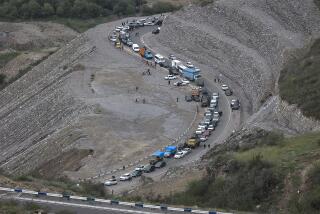Moscow Rejects Armenia’s Plea : Refuses to Transfer Disputed Ethnic Region
- Share via
MOSCOW — In a decision that places the Kremlin in direct confrontion with the largest protest movement in recent Soviet history, the Presidium of the Supreme Soviet on Monday rejected Armenian demands to take over the disputed Nagorno-Karabakh region in the neighboring Republic of Azerbaijan.
After an eight-hour meeting in the Kremlin, the leadership of the country’s nominal Parliament ruled that Nagorno-Karabakh will continue to be part of Azerbaijan, even though its people are predominantly Armenian.
According to Tass, the Soviet news agency, the Presidium agreed to ensure “the region’s real autonomy” and a comprehensive program for social, economic and cultural development in the area.
Nagorno-Karabakh was designated an autonomous oblast in 1923--an oblast being a self-governing region containing a population that is ethnically different from that of the people in the Soviet republic in which it is located. The Armenians living in Nagorno-Karabakh, mostly Christians, argue that this status has little real meaning and that they have been oppressed by the Muslim Azerbaijanis.
Last February, strikes and protests erupted in Stepanakert, the capital of Nagorno-Karabakh, and in Yerevan, the capital of Armenia. Tensions have been running high ever since, with mass rallies, prolonged strikes and clashes with police and the military. By official count, 36 people have been killed in the unrest.
Vote to Secede
Last week, the regional council of Nagorno-Karabakh voted to secede from Azerbaijan, and the decision was endorsed by the Armenian legislature.
News of Monday’s ruling by the Supreme Soviet was not made known immediately to the Soviet public. The main evening television news program noted that the Supreme Soviet had taken up the question and that any decision would be made public today.
A news conference scheduled for Monday to explain the ruling was also postponed until today. Tass printed excerpts of the remarks of most speakers but said that those of Soviet leader Mikhail S. Gorbachev would not be available until today.
It was not known how the ruling will be received in the troubled region, but it did not seem likely that the people there will be satisfied with pledges of “real autonomy” and greater cultural freedom.
Armenian leaders who argued their case here were clearly displeased with the decision. Tass quoted the head of the region’s governing committee, Genrikh Pogosyan, as saying in the course of the debate: “Nagorno-Karabakh has from time immemorial been inhabited by Armenians and is part of their fatherland. Secession from Azerbaijan can be the only possible solution.”
Azerbaijanis Resettled
He was quoted as saying that Soviet troops had forced some 1,500 Azerbaijanis living in Armenia to resettle in the disputed region.
The leader of the Armenian legislature, Grant M. Voskanyan, was quoted as warning the Supreme Soviet that an adverse decision could bring “pain and disappointment to the Armenian people.” According to Tass, he said the Supreme Soviet had failed to understand “the acuteness and the tragedy of the situation in Armenia and Nagorno-Karabakh.”
“What is at issue here is the constitutional right of a nation to self-determination,” Voskanyan reportedly said.
The president of Azerbaijan’s legislature, Suleiman B. Tatliyev, was said to have argued against transferring the region. He was quoted as saying that the protest movement was in the hands of anti-state elements, adding:
“More than a million Armenians in the Soviet Union live outside Armenia. If the logic of the deputies from Nagorno-Karabakh is followed, then all the territories in which they now live will have to be made part of Armenia.”
Gorbachev Must Now Decide
The decision to reject the Armenian demand means that Gorbachev must now decide how to deal with the protest movement. There is little question that, if he wishes to do so, he can simply crush the protest, as dissent has been crushed in the past.
But any such move would constitute a serious setback to the limited freedom of expression that has emerged here under Gorbachev in the last three years. And it would be a serious blow to his international image.
Still, media commentaries condemning the protest movement as anti-Soviet and as a danger to the economic health of the country are being interpreted as a strong indication that the Kremlin leaders are not likely to let the strikes and demonstrations resume their previous intensity.
Pravda, the Communist Party newspaper, published a statement by the Armenian party leader, M. S. Minisbekjan, urging a return to normal conditions in Yerevan. He said the strike leaders no longer have Armenia’s best interests at heart.
Other articles have attempted to isolate the activists as anti-social, and some observers said this appeared to lay the groundwork for a move against protest leaders if they call for more demonstrations.
More to Read
Sign up for Essential California
The most important California stories and recommendations in your inbox every morning.
You may occasionally receive promotional content from the Los Angeles Times.













